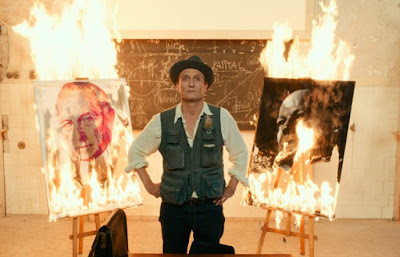Are you aware of the work of the late Mexican architect, Luis Barragán? I was not until I saw the new documentary, THE PROPOSAL, in which what we view of Barragán's architecture reminded me quite a bit of the paintings of Giorgio de Chirico: full of beauty, simplicity and solitude. The film was conceived and directed by visual artist and writer Jill Magid, pictured below. Since this is the artist's first film, I am linking her name to her Wikipedia page rather than to the IMDB. For a first film, however, this is one whoppingly good and original piece of work.
From what we learn and see in this documentary, there is a limited amount of Barragán's work (the architect is shown below) available to be appreciated by the public, thanks to ownership of his archives and "brand" by a corporation located in Switzerland. Ms Magid wants to visit that archive and explore what's there, but the corporation -- via a woman named Federica, who is in charge of the archives -- says no. Ms Magid is a persistent little thing, however, and this one-of-a-kind, funny, provocative, unsettling documentary tells us the story of what happens after this request is refused. And -- oh, boy-- Magid is a very good storyteller.
Storytelling, in fact, is part of what this doc is all about. In it, we meet the artist, of course, along with quite a few members of the Barragán family (one of whom is now in memoriam, as we learn via the end credits) and see that they, as well as the Mexican government, want the archives returned to Mexico. So we travel from the USA to Mexico to Switzerland and back, as Magid attempts to help this process along. To talk a lot about content here would simply give away too many spoilers, and the movie is really so much fun that we oughtn't do that.
We do learn that Magid has her "artistic" quirks -- a mystical side, that includes includes leaving a plate of Barragán's favorite cookies by the bedside in the room he used to sleep. If that provokes, an "Oh, please" response, just remember that all artists (human beings, after all) have their quirks -- Picasso on down (or up, depending on your taste). Artists are crazy, right? And Magid often proves crazy like a fox. How she has organized her documentary, so that viewers learn just what we need to know, and in the way and time we need to know it, proves exemplary storytelling.
Along the way the architect's ashes (well, some of them, anyway) are turned into something quite wild and wonderful, and what happens to what-they-become is paramount here. We follow along as Jill chases the elusive Federica, and all this is like a marvelous mystery somewhere between Hitchcock and Nancy Drew. And by movie's end, its title takes on enough delight and irony to have you leaving the theatre walking on air.
That titular proposal is quite something. We learn part of it, but Magid wisely leaves all of it until the finale -- which could hardly be more mouth-agape perfect if some storied, award-winning filmmaker had done this work. By the end of The Proposal, you will have confronted art and ownership, morality, the meaning of provenance and control, seen and heard greed and hypocrisy in action, witnessed an art installation that you suddenly become part of, and been treated to some unusual ideas about love of art (and artists), plus so much more. And you'll have viewed a documentary that TrustMovies thinks is one for the ages. It's that special.
Distributed via Oscilloscope Films and running 86 minutes, the doc opens theatrically on Friday, May 24, in New York City at the IFC Center, and the following Friday, May 31, in the Los Angeles area at the Monica Film Center. As of now, it will also hit a few other cities and theaters; click here to view currently scheduled playdates, cities and theaters.






















































